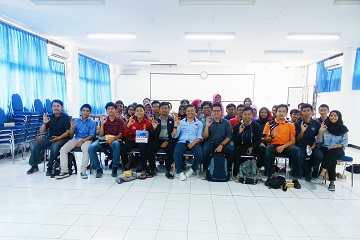IPB Researcher: Indonesia’s Coral Reef Ecosystem Declines

Dr Hawis Maddupa, a researcher at the Department of Marine Science and Technology, Faculty of Fisheries and Marine Science, Bogor Agricultural University (ITK FPIK IPB) explained the importance of studying methods to collect fish on coral reefs. He conveyed this in front of the students of FPIK IPB during Fish Survey Method Workshop held by Fisheries Diving Club (FDC) at the auditorium of the department, IPB Dramaga Campus (10/5). The seminar was held to improve knowledge in marine science and biota identification, especially in coral reefs.
"The development of coral reef ecosystems continues to experience degradation, thus, monitoring is required. It is useful to identify which actions that should be done in order to conserve the fish," he said.
According to the founder of FDC IPB, fish monitoring in coral reef is often done by FDC FPIK IPB. There are two methods in data collection of fish, namely spot survey and fish transect. In spot survey, monitoring is done at one particular spot. Meanwhile, fish transects are subdivided into two, namely belt transect using roll meters and time restricted transects that are limited by time. Fish data collection on coral reefs generally takes one to two hours. The number of surveyors is adjusted the needs. Generally, fish data collection requires two people to record large and small fish.
Stereo-video is one of the technologies developed lately and is often used in data collection of fish on coral reefs. The use of this stereo-video has advantages such as being able to monitor directly and quickly and being capable of detecting the biomass and the size of the fish.
"Since 1999, I have started surveying. At that time, I was still active in FDC FPIK IPB. There were interesting experiences during surveys in Jakarta Bay and Raja Ampat. In Jakarta Bay, an extra effort was needed because the waters have high turbidity level. Meanwhile, Raja Ampat was still rich in fish so we could find rare fish," said Dr. Hawis.
Meanwhile, according to Siti Khodijah, the Chief Executive, said that this workshop can be used as a learning ground for scientific divers, especially for internal members of FDC FPIK IPB, to do fish collection on coral reefs.
"Participants were also trained to identify fish whether it is juvenile or adult fish. Participants also recognized the types of important fish in coral reefs," she said. (AD/ZSP/Zul)



